Connect With Us
Blog
Items filtered by date: November 2022
Simple Steps for Everyday Foot Care
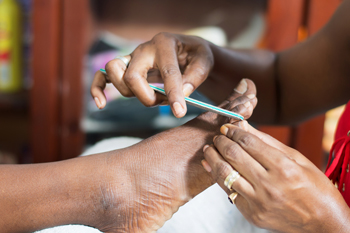
Many people connect that the quality of their life is based on how good their feet feel. They are the foundation of the body, and completing daily activities may be difficult with aching feet. Additionally, poor foot health may limit exercise completely, or limit the amount of time spent practicing it. There are simple habits that can ensure healthy feet when everyday foot care techniques are enforced. These start with washing and drying the feet thoroughly, followed by applying a good moisturizer on them. It is beneficial to have the toenails properly trimmed, and this can be done by having regular pedicures done, or by cutting them at home using a stainless steel clipper. The feet will feel good when they are soaked in warm water at the end of the day, which may have a soothing effect on the overall body. Additionally, the type of shoes that are worn contributes significantly to how the feet feel. It is beneficial to wear shoes that are the correct size, have ample room for the toes to move freely in, and are comfortable. If you would like to have additional tips on following a daily foot care routine, please confer with a podiatrist.
Everyday foot care is very important to prevent infection and other foot ailments. If you need your feet checked, contact Dr. Rouder from S.I. Podiatry. Our doctor can provide the care you need to keep you pain-free and on your feet.
Everyday Foot Care
Often, people take care of their bodies, face and hair more so than they do for their feet. But the feet are a very important aspect of our bodies, and one that we should pay more attention to. Without our feet, we would not be able to perform most daily tasks.
It is best to check your feet regularly to make sure there are no new bruises or cuts that you may not have noticed before. For dry feet, moisturizer can easily be a remedy and can be applied as often as necessary to the affected areas. Wearing shoes that fit well can also help you maintain good foot health, as well as making it easier to walk and do daily activities without the stress or pain of ill-fitting shoes, high heels, or even flip flops. Wearing clean socks with closed shoes is important to ensure that sweat and bacteria do not accumulate within the shoe. Clean socks help to prevent Athlete’s foot, fungi problems, bad odors, and can absorb sweat.
If you have any questions please feel free to contact our office located in Staten Island, NY . We offer the newest diagnostic and treatment technologies for all your foot and ankle needs.
How Orthotics Affect Your Feet
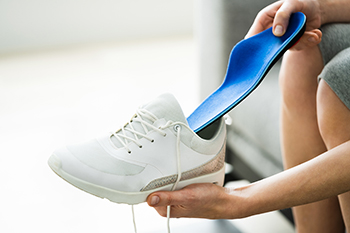
Sometimes the best way to deal with pain in your feet is to wear orthotic devices in your shoes. These inserts can help to support, align, and compensate for deformities you may have that affect your gait or induce pain. Orthotic devices are often recommended for people who have flat feet, as they often cause the foot to roll inward. This movement on a regular basis can further lead to plantar fasciitis, Achilles tendonitis, and other tendon ailments in the foot. If you have flat feet, an orthotic device can compensate by supplying the proper cushioning for the arch, while correcting foot placement. These devices not only can correct the foot problem you may be experiencing, but also help with any leg and knee pain that may result from it. A podiatrist can prescribe a custom orthotic device that best suits your specific needs, taking into account the type of problem, its severity, and its repercussions.
If you are having discomfort in your feet and would like to try orthotics, contact Dr. Rouder from S.I. Podiatry. Our doctor can provide the care you need to keep you pain-free and on your feet.
What Are Orthotics?
Orthotics are inserts you can place into your shoes to help with a variety of foot problems such as flat feet or foot pain. Orthotics provide relief and comfort for minor foot and heel pain but can’t correct serious biomechanical problems in your feet.
Over-the-Counter Inserts
Orthotics come in a wide variety of over-the-counter inserts that are used to treat foot pain, heel pain, and minor problems. For example, arch supports can be inserted into your shoes to help correct overarched or flat feet, while gel insoles are often used because they provide comfort and relief from foot and heel pain by alleviating pressure.
Prescription Orthotics
If over-the-counter inserts don’t work for you or if you have a more severe foot concern, it is possible to have your podiatrist prescribe custom orthotics. These high-quality inserts are designed to treat problems such as abnormal motion, plantar fasciitis, and severe forms of heel pain. They can even be used to help patients suffering from diabetes by treating foot ulcers and painful calluses and are usually molded to your feet individually, which allows them to provide full support and comfort.
If you are experiencing minor to severe foot or heel pain, it’s recommended to speak with your podiatrist about the possibilities of using orthotics. A podiatrist can determine which type of orthotic is right for you and allow you to take the first steps towards being pain-free.
If you have any questions please contact our office located in Staten Island, NY . We offer the newest diagnostic and treatment technologies for all your foot and ankle needs.
Medication and Toenail Fungus
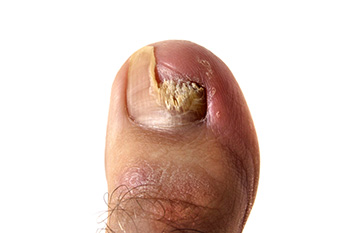
Many people who have toenail fungus are self-conscious about their feet. It is an unsightly foot condition and can cause patients to avoid wearing shoes that have an open toe. The medical term for this ailment is onychomycosis, and it is a fungal infection of the toenail. There are symptoms that gradually develop and can become quite obvious. These can include yellowed and thickened toenails, and in severe cases, the nail may fall off. The big toe is generally the first toe to be affected, and may spread to the other toes if treatment is not received. The fungus that causes this condition lives in warm environments and can enter the body through small cuts in the skin on the feet. People who have diabetes, a weakened immune system, or poor blood circulation may be prone to getting toenail fungus, and it is important to seek prompt medical attention when the first symptoms appear on the nail. If you are afflicted with this condition, it is suggested that you seek the counsel of a podiatrist who can prescribe the necessary medication for the removal of this fungus.
If left untreated, toenail fungus may spread to other toenails, skin, or even fingernails. If you suspect you have toenail fungus it is important to seek treatment right away. For more information about treatment, contact Dr. Rouder of S.I. Podiatry. Our doctor can provide the care you need to keep you pain-free and on your feet.
Symptoms
- Warped or oddly shaped nails
- Yellowish nails
- Loose/separated nail
- Buildup of bits and pieces of nail fragments under the nail
- Brittle, broken, thickened nail
Treatment
If self-care strategies and over-the-counter medications does not help your fungus, your podiatrist may give you a prescription drug instead. Even if you find relief from your toenail fungus symptoms, you may experience a repeat infection in the future.
Prevention
In order to prevent getting toenail fungus in the future, you should always make sure to wash your feet with soap and water. After washing, it is important to dry your feet thoroughly especially in between the toes. When trimming your toenails, be sure to trim straight across instead of in a rounded shape. It is crucial not to cover up discolored nails with nail polish because that will prevent your nail from being able to “breathe”.
In some cases, surgical procedure may be needed to remove the toenail fungus. Consult with your podiatrist about the best treatment options for your case of toenail fungus.
If you have any questions, please feel free to contact our office located in Staten Island, NY . We offer the newest diagnostic and treatment technologies for all your foot care needs.
Wearing Flip Flops Can Be Harmful to the Feet
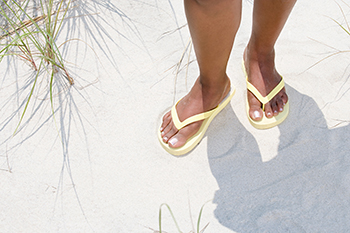
Wearing flip-flops during the warmer months is simple, stylish, and convenient. Despite these fun facts, they can wreak havoc on your feet. Foot pain may gradually develop when flip-flops are frequently worn. Most flip-flops don't have arch support, and shock absorption is minimal. Additionally, they are not sturdy shoes, and the heels are not cushioned. The toes work hard to keep the flip-flops securely on the feet, and hammertoe may be a foot condition that develops as the toes bend to keep the shoe from slipping off. Flip-flops are designed in different styles, and it is suggested to choose sandals that have a back strap. This may help the toes to maintain balance instead of gripping the front of the shoe to stabilize the foot. If you have questions about what type of flip-flops to purchase, please confer with a podiatrist who can address any concerns you may have.
Flip-flops can cause a lot of problems for your feet. If you have any concerns about your feet or ankles, contact Dr. Rouder from S.I. Podiatry. Our doctor will assist you with all of your foot and ankle needs.
Flip-Flops and Feet
Flip-flops have managed to become a summer essential for a lot of people. While the shoes may be stylish and easy to slip on and off, they can be dangerous to those who wear them too often. These shoes might protect you from fungal infections such as athlete’s foot, but they can also give you foot pain and sprained ankles if you trip while wearing them.
When Are They Okay to Wear?
Flip-flops should only be worn for very short periods of time. They can help protect your feet in places that are crawling with fungi, such as gym locker rooms. Athlete’s foot and plantar warts are two common fungi that flip-flops may help protect your feet against.
Why Are They Bad for My Feet?
These shoes do not offer any arch support, so they are not ideal for everyday use. They also do not provide shock absorption or heel cushioning which can be problematic for your feet. Additionally, you may suffer from glass cuts, puncture wounds, and stubbed toes since they offer little protection for your feet.
More Reasons Why They Are Bad for Your Feet
- They Slow You Down
- May Cause Blisters and Calluses
- Expose Your Feet to Bacteria
If you have any questions, please feel free to contact our office located in Staten Island, NY . We offer the newest diagnostic and treatment technologies for all your foot care needs.
Are You Suffering From Ingrown Toenails?
Treating Achilles Tendon Injuries
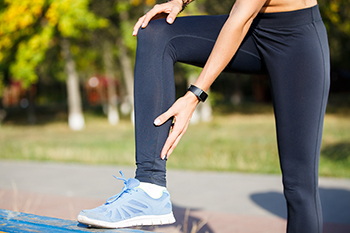
The Achilles tendon is a band of tissue that connects muscles in the lower leg to the heel bone. This is a critical body part that can be associated with a variety of injuries. If one has developed an Achilles tendon injury, there are several things that might be done to treat such an injury. For example, an Achilles tendon rupture might be treated by ensuring that the patient receives sufficient rest. Additionally, the Achilles tendon rupture may be treated with serial casting. In some cases, undergoing a surgical procedure might be used to treat an Achilles tendon rupture. If a surgical procedure is performed, it might close the ends of the affected tendon. If you believe that you have suffered an Achilles tendon injury, contact a podiatrist today.
Achilles tendon injuries need immediate attention to avoid future complications. If you have any concerns, contact Dr. Rouder of S.I. Podiatry. Our doctor can provide the care you need to keep you pain-free and on your feet.
What Is the Achilles Tendon?
The Achilles tendon is a tendon that connects the lower leg muscles and calf to the heel of the foot. It is the strongest tendon in the human body and is essential for making movement possible. Because this tendon is such an integral part of the body, any injuries to it can create immense difficulties and should immediately be presented to a doctor.
What Are the Symptoms of an Achilles Tendon Injury?
There are various types of injuries that can affect the Achilles tendon. The two most common injuries are Achilles tendinitis and ruptures of the tendon.
Achilles Tendinitis Symptoms
- Inflammation
- Dull to severe pain
- Increased blood flow to the tendon
- Thickening of the tendon
Rupture Symptoms
- Extreme pain and swelling in the foot
- Total immobility
Treatment and Prevention
Achilles tendon injuries are diagnosed by a thorough physical evaluation, which can include an MRI. Treatment involves rest, physical therapy, and in some cases, surgery. However, various preventative measures can be taken to avoid these injuries, such as:
- Thorough stretching of the tendon before and after exercise
- Strengthening exercises like calf raises, squats, leg curls, leg extensions, leg raises, lunges, and leg presses
If you have any questions please feel free to contact our office located in Staten Island, NY . We offer the newest diagnostic tools and technology to treat your foot and ankle needs.

